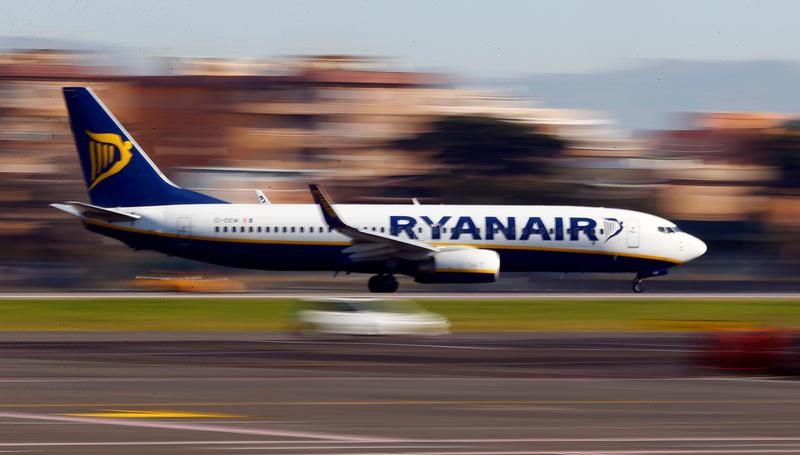By Alistair Smout and Kate Holton
LONDON (Reuters) - Ryanair (I:RYA), Europe's largest airline by passenger numbers, plans to pivot its growth away from Britain over the next two years as it fears the lack of clarity over Brexit will cause major travel disruption and hit demand.
Airlines such as Ryanair and rival easyJet (L:EZJ) have urged the British government to put aviation at the front of the queue when negotiating its EU exit because they need to finalise their 2019 summer schedules in the first half of next year.
Ryanair has warned more stridently than peers of the dangers of neglecting aviation in the negotiations, saying that there may be no flights between the UK and Europe for a period of time if a special aviation deal is not agreed.
Without a deal, it is unclear what rules would govern airlines with significant British and EU business after Brexit. The uncertainty is pushing Ryanair to look outside Britain to grow the network by adding new routes and flights.
"Ryanair is pivoting its growth away from the UK," Finance Director Neil Sorahan told reporters in London, adding that the airline had planned to grow by about 15 percent in the UK last year but had instead posted growth of about 6 percent.
He said that Brexit will "inevitably" lead to a slowdown in growth in the UK and Europe, and added that, unless the government can provide greater certainty as to how airlines will be able to operate in the future, growth may slow more sharply as the end of the two-year divorce process approaches.
"The clock is ticking," Sorahan said. "Every day that goes past is another day that we still don't know where we're going."
The EU's chief negotiator has set a target of agreeing a Brexit deal with Britain by October 2018 though diplomats on both sides admit they face years arduous talks.
Airlines based in the EU have the right to fly to, from and within any country in the bloc thanks to the single aviation market created in the 1990s, meaning Britain has just two years to renegotiate access or come up with an alternative system.
Failure to agree a new deal could mean airlines having to rely on older, more restrictive bilateral ties between Britain and the other 27 individual EU member states, which would not allow for airlines like easyJet to fly between two EU countries.
EXTREME TURBULENCE
Luton-based easyJet has been one of the hardest hit by the vote, with its shares down by a third due to its exposure to the British consumer and its role flying between the remaining 27-member states which make up 30-40 percent of its business.
It has said it is close to applying for a licence to set up an operating company within the EU to protect its intra-EU flights.
Dublin-based Ryanair would not be able to fly intra-UK routes without an agreement or a UK operating base. Sorahan said that the airline had not yet decided whether it would try to secure a British air operating licence, and could instead cut its flights within Britain, which only account for around 2 percent of its business.
He said a decision would be made over the next 12 months.
Chief Marketing Officer Kenny Jacobs said that Ryanair had been disappointed that British Prime Minister Theresa May did not mention the aviation sector in her letter triggering formal Brexit negotiations last week.
"If we had seen in Theresa May's letter a specific reference to Open Skies, that would've been good," Jacobs said, adding that a sector by sector approach to negotiations would help.
May has held back from detailing her priorities for individual sectors, saying little more than she wants the closest possible economic ties with the bloc when Britain departs.

That has frustrated some sectors, such as financial services, which hoped to sway the government into prioritising their concerns above others to get early certainty.